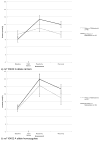CRHR1 genotype and history of maltreatment predict cortisol reactivity to stress in adolescents
- PMID: 24703172
- PMCID: PMC3986273
- DOI: 10.1016/j.psyneuen.2014.02.002
CRHR1 genotype and history of maltreatment predict cortisol reactivity to stress in adolescents
Abstract
This study examined the contributions of a polymorphism of the corticotropin-releasing hormone receptor type I (CRHR1) gene (rs110402) and a history of child maltreatment--alone and in interaction--to patterns of cortisol reactivity in adolescents. Adolescents between the age of 13 and 17 years with (n=61) and without (n=97) a history of child maltreatment were exposed to the Trier Social Stress Test (TSST). Salivary cortisol was assessed at baseline, and 15 and 30 min after the start of the speech portion of the TSST. Saliva samples for genotyping rs110402 also were collected. Adolescents with one or more G alleles of rs110402, relative to A allele homozygotes, and those exposed to maltreatment, relative to non-exposed adolescents, exhibited blunted cortisol reactivity to the TSST (although these associations approached, but did not reach, the level of statistical significance when accounting for underlying population structure in our racially and ethnically diverse sample). There was also a trend for a stronger child maltreatment association with cortisol hypo-reactivity among G allele carriers, but this association was not statistically significant. Findings suggest that CRHR1 variation may moderate the downstream effects of child maltreatment on HPA axis function, and implications for understanding mechanisms of risk associated with early adversity are discussed.
Keywords: Adolescence; CRHR1; Child maltreatment; Cortisol; Genetics; Stress reactivity; Trier Social Stress Test.
Copyright © 2014 Elsevier Ltd. All rights reserved.
Conflict of interest statement
Conflicts of Interest
The authors declare that they have no conflicts of interest.
Figures




Similar articles
-
Salivary cortisol response to psychosocial stress in the late evening depends on CRHR1 genotype.Psychoneuroendocrinology. 2020 Jun;116:104685. doi: 10.1016/j.psyneuen.2020.104685. Epub 2020 Apr 18. Psychoneuroendocrinology. 2020. PMID: 32361186
-
Interaction of childhood maltreatment with the corticotropin-releasing hormone receptor gene: effects on hypothalamic-pituitary-adrenal axis reactivity.Biol Psychiatry. 2009 Oct 1;66(7):681-5. doi: 10.1016/j.biopsych.2009.05.012. Epub 2009 Jul 12. Biol Psychiatry. 2009. PMID: 19596121 Free PMC article.
-
Genetic association of FKBP5 and CRHR1 with cortisol response to acute psychosocial stress in healthy adults.Psychopharmacology (Berl). 2013 May;227(2):231-41. doi: 10.1007/s00213-012-2956-x. Epub 2012 Dec 30. Psychopharmacology (Berl). 2013. PMID: 23274505 Free PMC article.
-
A meta-analysis of cortisol reactivity to the Trier Social Stress Test in virtual environments.Psychoneuroendocrinology. 2019 Dec;110:104437. doi: 10.1016/j.psyneuen.2019.104437. Epub 2019 Sep 6. Psychoneuroendocrinology. 2019. PMID: 31536942 Review.
-
The role of rs242941, rs1876828, rs242939 and rs110402 polymorphisms of CRHR1 gene and the depression: systematic review and meta-analysis.Genes Genomics. 2021 Nov;43(11):1339-1349. doi: 10.1007/s13258-021-01133-9. Epub 2021 Jul 19. Genes Genomics. 2021. PMID: 34279801
Cited by
-
Epigenetic Effects in HPA Axis Genes Associated with Cortical Thickness, ERP Components and SUD Outcome.Behav Sci (Basel). 2022 Sep 20;12(10):347. doi: 10.3390/bs12100347. Behav Sci (Basel). 2022. PMID: 36285916 Free PMC article.
-
Aneurysmal subarachnoid haemorrhage: effect of CRHR1 genotype on fatigue and depression.BMC Neurol. 2020 Apr 18;20(1):142. doi: 10.1186/s12883-020-01727-y. BMC Neurol. 2020. PMID: 32305063 Free PMC article.
-
Genetic Contributions to Attachment Stability Over Time: the Roles of CRHR1 Polymorphisms.J Youth Adolesc. 2024 Feb;53(2):273-283. doi: 10.1007/s10964-023-01888-2. Epub 2023 Oct 27. J Youth Adolesc. 2024. PMID: 37891393
-
Corticotropin-Releasing Factor Receptor 1 Antagonism Is Ineffective for Women With Posttraumatic Stress Disorder.Biol Psychiatry. 2017 Dec 15;82(12):866-874. doi: 10.1016/j.biopsych.2017.06.024. Epub 2017 Jul 4. Biol Psychiatry. 2017. PMID: 28793974 Free PMC article. Clinical Trial.
-
Interactions Between Anandamide and Corticotropin-Releasing Factor Signaling Modulate Human Amygdala Function and Risk for Anxiety Disorders: An Imaging Genetics Strategy for Modeling Molecular Interactions.Biol Psychiatry. 2016 Sep 1;80(5):356-62. doi: 10.1016/j.biopsych.2015.12.021. Epub 2016 Jan 5. Biol Psychiatry. 2016. PMID: 26923505 Free PMC article.
References
-
- Amstadter AB, Nugent NR, Yang B-Z, Miller A, Siburian R, Moorjani P, Haddad S, Basu A, Fagerness J, Saxe G, Smoller JW, Koenen KC. Corticotropin-releasing hormone type 1 receptor gene (CRHR1) variants predict posttraumatic stress disorder onset and course in pediatric injury patients. Dis Markers. 30:89–99. - PMC - PubMed
-
- Bernstein DP, Ahluvalia T, Pogge D, Handelsman L. Validity of the Childhood Trauma Questionnaire in an adolescent psychiatric population. J Am Acad Child Psy. 1997;36:340–348. - PubMed
-
- Bernstein DP, Fink L, Hondelsman L, Foote J, Lovejoy M. Initial reliability and validity of a new retrospective measure of child abuse and neglect. Am J Psychiat. 1994;151:1132–1136. - PubMed
-
- Bifulco A, Brown GW, Harris TO. Childhood Experiences of Care and Abuse (CECA): a retrospective interview measure. J Child Psychol Psyc. 1994;35:1419–1435. - PubMed
-
- Bifulco A, Brown GW, Lillie A, Jarvis J. Memories of childhood neglect and abuse: Corroboration in a series of sisters. J Child Psychol Psyc. 1997;38:365–374. - PubMed
Publication types
MeSH terms
Substances
Grants and funding
LinkOut - more resources
Full Text Sources
Other Literature Sources
Medical

